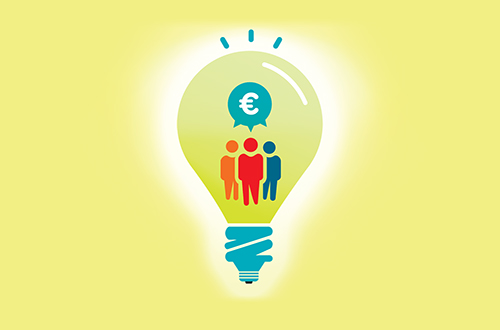#content#
OCU launches its third collective energy purchase
30 mar. 2016OCU launches its third collective energy purchase with two main goals in mind: to obtain a competitive rate for users which allows them to save on their electricity bill and to fight for a fairer energy market for consumers.
Various authorities, at both the national and European levels, have recognised collective purchases as an instrument which allows consumers to have a stronger presence and the ability to make decisions in the market. For this reason, they have included these collective purchases in the group of measures and recommendations which are attempting to increase competition in the market. During the two previous collective energy purchase campaigns, more than 610,000 households joined the movement quieropagarmenosluz.com, an initiative led by OCU.
The way this 3rd edition of the collective purchase works is similar to the previous initiatives. During the first phase, consumers must register on the webpage www.quieropagarmenosluz.org. Registration is free and there is no commitment. Participants will then choose if they are interested in electricity, natural gas or a joint offer for both forms of energy. Once the purchase group is formed, consumption data is subsequently used to open a tender process to which all Spanish power companies have been invited by OCU. The most economic bid in each category will be selected as the winners.
In this edition, OCU's goal is to give importance to those rates with time-based pricing. The purpose of time-based pricing rates is to transfer consumption to hours in which there is less demand for electricity, allowing the majority of households to increase their average annual savings to 100 Euros.
Aware that the majority of consumers do not know much about the energy sector, one of the novelties of this 3rd edition is that OCU will carry out a personalised study for each of the participants that includes an evaluation of their current rate, comparing it with other rates found on the market and informing participants of their potential savings. Additionally, OCU will offer advice on how to reduce their electricity and natural gas expenses.
Starting today, March 30th, all consumers interested in the Collective Energy Purchase can register. Registration will be possible until May 3rd. A few days after the end of the registration period, the tender process will be opened for all of the various power companies. Once the winning bid has been chosen, OCU will notify participants of this decision. After receiving notification of the winning bids, the users will have to decide whether they are interested in the taking advantage of the conditions offered and may then proceed to change providers.
OCU's goal with this initiative is to make consumers more active players in the energy market and to seek a more competitive rate which does not include abusive clauses, offers additional services and that does not have any long-term commitments to stay with the companies.
Ten proposals for a fairer energy market
Moreover, the OCU-led movement quieropagarmenosluz.org wants to fight for a fairer energy market. Even though many years have passed since the supposed liberalisation of the energy market, the current situation continues to be quite bleak for consumers. Large price increases, a lack of competition and the deterioration of consumers' rights is the general trend found in this sector.
In order to achieve a fairer market for consumers, OCU is asking citizens to support the ten measures it proposes:
1. Auditing of the electrical system: this includes both the revision of the costs assigned to the fees and tolls charged for third party access to the electrical grid network and the system for setting wholesale electricity prices.
2. Promoting a competitive market: this requires increasing the number of operators, especially with regards to natural gas, which are separate from the distribution and generation networks.
3. Maintaining the regulated rate (Voluntary Price for Small Consumers-VPSC for electricity and Last Resort Rate-LRR for natural gas): until a competitive energy market is guaranteed, the disappearance of these rates would mean even more unfair conditions for consumers.
4. Modifying the Personal Consumption Regulation: this regulation needs to be substituted for another which eliminates the current barriers (e.g. not including the net balance, fees for access to the electrical grid for those who produce their own electricity or the so-called "sun tax", fees and bureaucracy).
5. Effectively pursuing abusive commercial practices carried out by companies: avoiding brand confusion which makes it impossible to make distinctions among the different principal suppliers and those from the same group in the free market as well as the aggressive in-home sales campaigns.
6. Facilitating the complaint process: by means of an effective and regulated mechanism which is easily accessed by consumers. One such mechanism could be Consumer Arbitration, promoting its generalisation among the various operators.
7. Creating a "Social Rate" and measures which fight against energy poverty: more attention must be given to the most underprivileged groups, protecting these individuals who find themselves in precarious situations. In order to do this, we are demanding the creation of a true "social rate" which guarantees that the most underprivileged consumers, based on their socio-economic condition, can have access to this special rate in an expeditious and effective way. This social rate must be complemented with special measures focused on protecting families who are at risk of falling into energy poverty.
8. Increasing the protection of consumers' rights: distributors and suppliers must adhere to clear obligations as well as keep consumers' rights in mind, both of which must not leave consumers powerless.
9. Making digital meters available to consumers: these make access to all the information regarding their electric consumption easier and transparent, guaranteeing privacy and the protection of consumers' personal information.
10. Promoting effective measures to increase savings: providing consumers with more information and a more active policy with regards to distributors and suppliers in order to offer consumers the best possible rate.
OCU has already presented these measures to various governmental entities (MINETUR, AECOSAN and the Community of Madrid) and is planning to send this document to all of the electrical market's main players.
For more information, please contact Eva Jiménez (media). Telephone: 91 722 60 61 -


